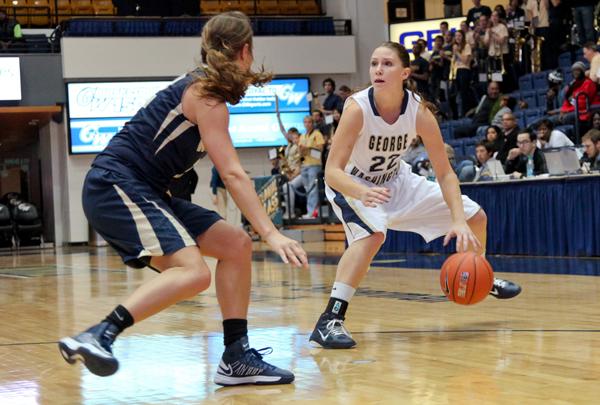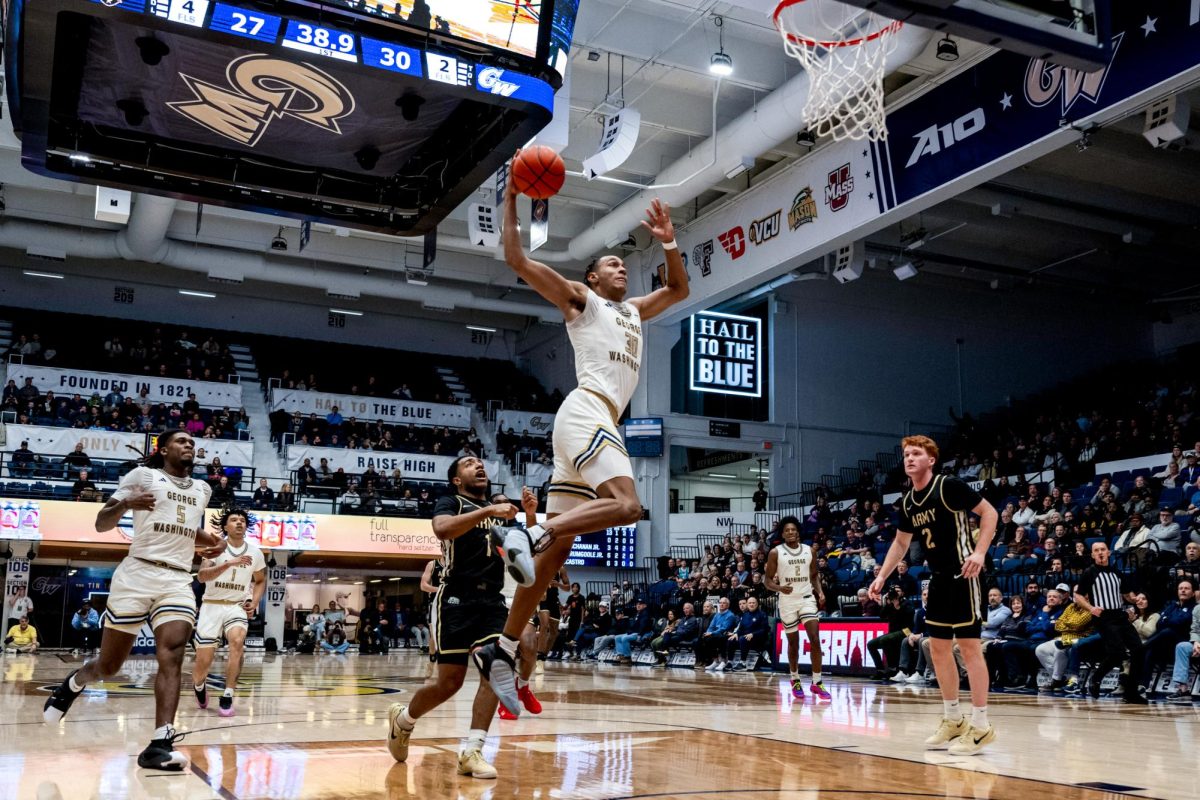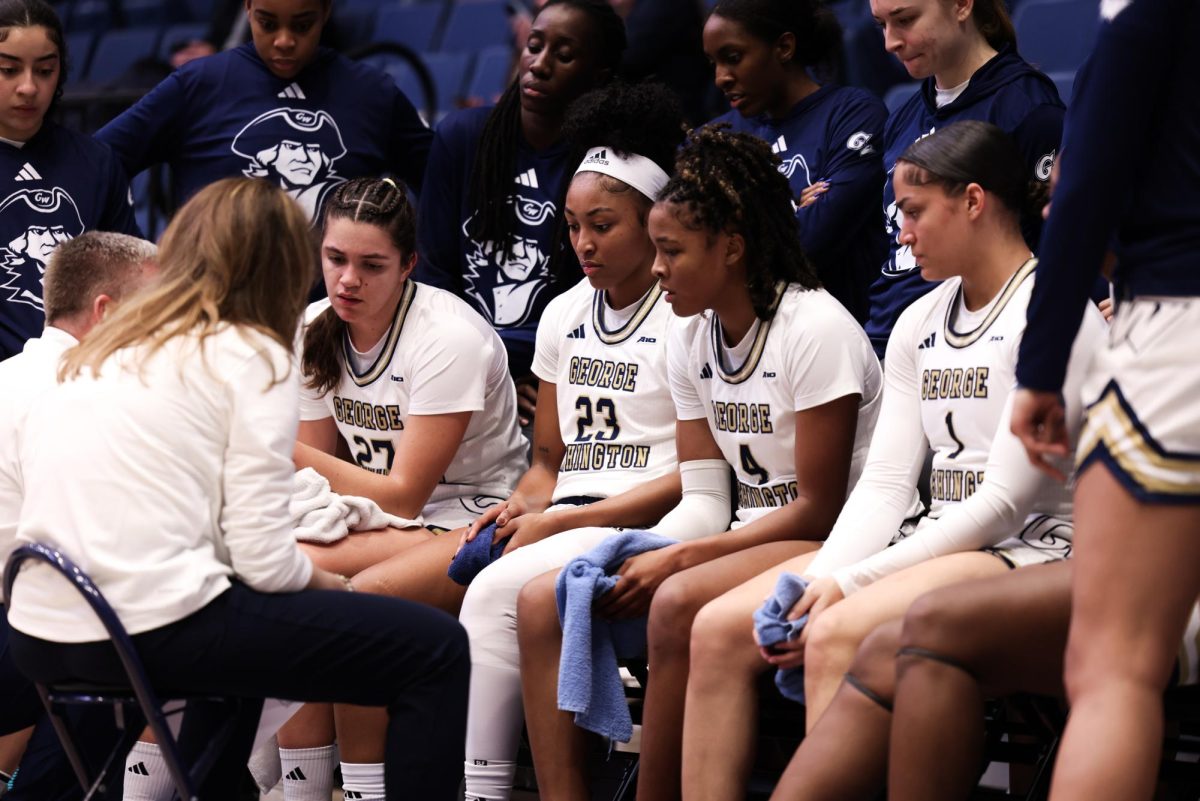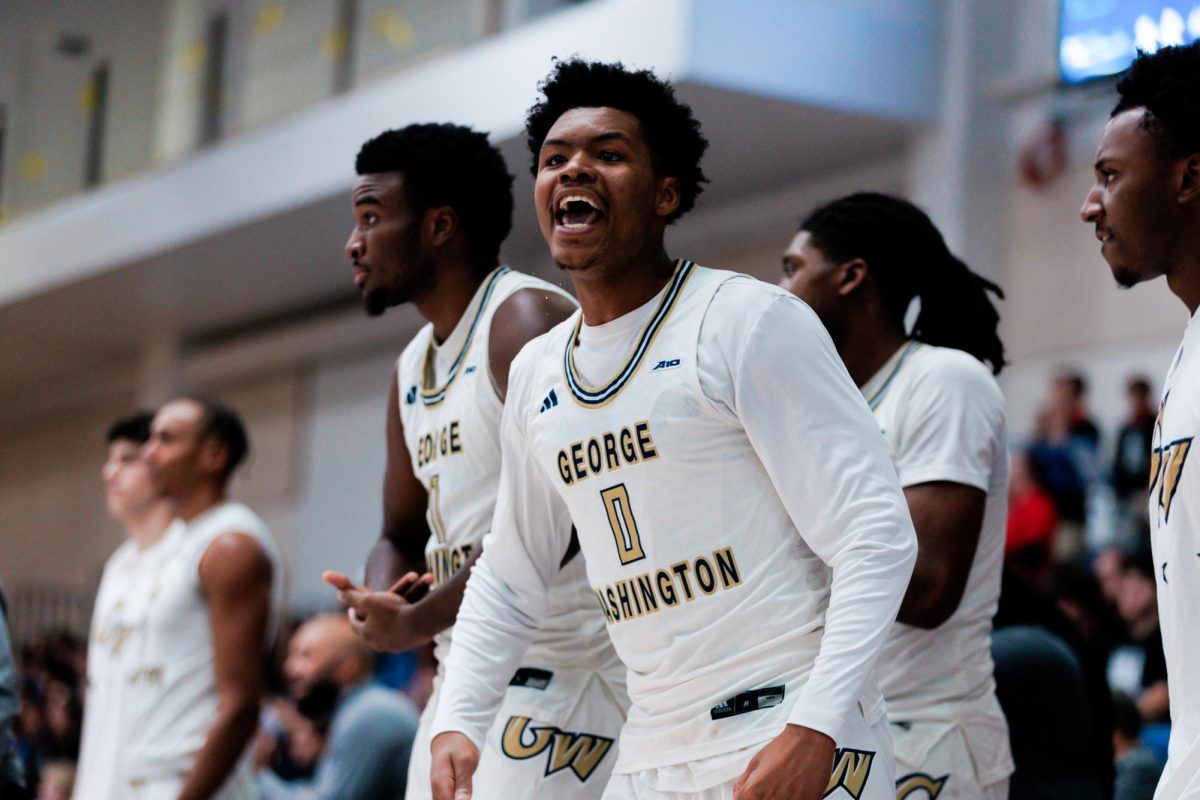The day after Christmas, women’s basketball co-captain Megan Nipe fully tore the ACL in her right leg. The graduate student’s season and career should have been over after five years without a postseason appearance.
When head coach Jonathan Tsipis told his leading scorer about the extent of her injury, she stared him back in the face and spoke defiantly, saying “Coach, I want to do this,” Tsipis said.
Over the next three months, Nipe figured out ways to play. She sat out five games while her knee regained some stability and then never missed another contest. She skipped just one practice along the way.
Nipe went on to record her 1,000th career point and remained the Colonials’ dominant scoring threat in their first major playoff run since 2008.
Meanwhile, she harbored a secret injury.
Tsipis and athletics director Patrick Nero decided not to disclose Nipe’s ACL tear, fearing that opponents would exploit her instability. Tsipis only revealed the injury after the Colonials’ Women’s NIT Sweet 16 loss to South Florida two weeks ago.
But playing with the secret took a toll on Nipe’s confidence while she got used to her new role off the bench.
“What’s worse? Struggling in public where everyone really knows what’s wrong, or struggling only when your teammates know? To everyone else it just looks like you’re not that great anymore,” Nipe said. “In your head you go, ‘If only you knew, you wouldn’t be saying half the things you do.’ But it was for the good of the team.”

“Not right now”
Nipe led the Colonials in scoring through their first 11 games, including a career-high 31 points in the shocking upset of then-No. 10 California when she lifted the team to victory with 22 second-half points.
She was the third-best scorer in the Atlantic 10, while the team was 8-4 through Dec. 21.
“I had felt like I was playing the best basketball of my career,” Nipe said. “We had been playing so well going into that Christmas break.”
The team seemed ready to vie for a top position in the A-10 conference after the addition of sophomore transfer Jonquel Jones – a 6-foot-4 post presence who could foster a potent inside-outside game. The two played one game together and combined for 40 points.
Five days later, Nipe fell while driving to the basket in a practice drill. Assistant athletic trainer Chad Jones said his first thought when she hit the court was, “Not right now.”
“We were about to get [Jonquel Jones] into the lineup and really see where this team could go. It was not a good day,” the trainer said.
When graduate student guard Danni Jackson, Nipe’s best friend and fellow team leader, heard the news she ran in tears to find her friend.
“She kept telling me, ‘I’m fine, I’m fine.’ I was just really crying, like if you lost a dog. I was really hurt,” Jackson said. “You would’ve thought it happened to me.”
Jackson became a source of comfort for Nipe as she came to terms with the severity of the injury.
“I was in my room with Danni when it hit me, because it had been such a great year so far. It kind of hit me, ‘I don’t know exactly where my season is going to go from here,'” Nipe said. “I kind of broke down and just put my head on Danni’s shoulder and just cried on her shoulder for a while.”

“What are my options?”
Tsipis has heard the scream of a player tearing her ACL so many times that he said it’s “etched” in his mind. But he never coached a player that came back to play on it like Nipe.
It was a special circumstance, with a “stubborn” player in her final year of eligibility and with all of conference play ahead of her, Jones said.
“You have an ACL for a reason. It’s not the appendix, you can’t just take it out and live your life,” Jones, the trainer, said. “You can walk without an ACL, it’s hard to run without an ACL. And it’s really hard to change directions and put a foot in the ground and change directions quickly without one.”
Without an ACL, the body does not always know where it is when the foot hits the ground, Jones said. He added that he had to teach Nipe how to balance on one leg while moving sideways, as well as how to stop.
Trainers first fit Nipe with a brace and took her through an intensive rehabilitation program, similar to the treatment one would receive after surgery.
For two extra hours a day, before and after practice, they went through routines: bandaging her leg from knee to toe, plunging her feet in buckets of ice and using a sleeve-like compression machine called NormaTec that helps increase blood-flow to flush lactic acid out of muscles.
“I think we were all scared.”
Nipe’s first game back came on the road against Dayton, which required one of the team’s only plane flights of the season. When she stepped off the plane and unraveled her bandage, Nipe said her toes were “so fat” because there was nowhere else for the swelling to go.
But she played. First, Nipe subbed in for four minutes, and made one shot. Then she came back in for six minutes and made a couple more.
“She hit a three and I was like, ‘Oh, okay. She can play. She’s fine,’” Jackson said.
Even Nipe felt fine, forgetting about her knee because of the game-time adrenaline rush.
“You don’t think about it in the middle of the game,” Nipe said. “You’re not really thinking of your best interest. You see the ball and go for it.”
But the injury was still there. A few plays later Nipe took another shot, missed it, and went for the offensive rebound – collapsing as she dove for a loose ball in front of the GW bench.
“I think we were all scared,” Tsipis said. “It was the first time in the game she had fallen.”
When Nipe fell, she jogged on the sidelines facing away from the court so no one could see her grimace. If she wanted to keep playing, she had to pretend she wasn’t hurt. She fell twice more during the season, once against Saint Joseph’s and again during the South Florida game.
The day before a Women’s NIT game against Villanova, she needed a “nice big needle” to drain fluid from her swollen knee.
“When you get out there, you kind of wonder, ‘Can I still do this? Can I still be helpful to the team or am I just doing this because I’m stubborn and don’t want to quit?’” Nipe said.

“I just hope this story inspires.”
In Nipe’s fifth and final season as a Colonial, GW had its most successful team in six years. Nipe eclipsed the 1,000-career points mark and the Colonials will hang a WNIT Sweet Sixteen banner from the Smith Center rafters.
She went on to average more than 12 points per game after her return and got better as the season went on, leading the team in scoring during the postseason with 16.3 points per game and shooting 65 percent from behind the arc.
“I wouldn’t have changed this season for anything, including my injury, if it got us this far,” Nipe said.
The injury was an unexpected speed bump on the journey of a comeback season for both Nipe and the entire program. During Nipe’s first season in 2009-10, the team won only six games.
Now, Nipe said she hopes her legacy will help build on that in years to come, inspiring future GW women’s basketball players to endure.
“If anything, I just hope this story inspires someone to just do a little more and get this team a little further than we did this year,” Nipe said. “Hopefully this story just helps them work a little harder.”







